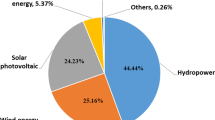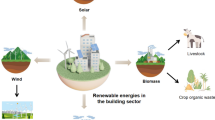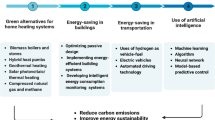Abstract
Although hybrid wind-biomass-battery-solar energy systems have enormous potential to power future cities sustainably, there are still difficulties involved in their optimal planning and designing that prevent their widespread adoption. This article aims to develop an optimal sizing of microgrids by incorporating renewable energy (RE) technologies for improving cost efficiency and sustainability in urban areas. Diverse RE technologies such as photovoltaic (PV) systems, biomass, batteries, wind turbines, and converters are considered for system configuration to obtain this goal. Net present cost (NPC) is this study’s objective function for optimal sizing microgrid configuration. For demonstration, we assess the technical, economic factors, and atmospheric emissions of optimal hybrid renewable energy systems for Putrajaya City in Malaysia. The required solar radiation data, temperature, and wind speeds are collected from the NASA surface metrological database. From the quantitative analysis of simulations, the biomass-battery-based system has optimal economic outcomes compared to other systems with an NPC of around 1.07 M$, while the cost of energy (COE) is 0.118 $/kWh. Moreover, environmentally safe nitrogen oxide emissions, carbon monoxide, and carbon dioxide concentrations exist. The grid-tied RE technology boasts cost-effectiveness, with an NPC of 348,318 $ and a COE of 0.0112 $/kWh. This study aids decision-makers in formulating policies for integrating hybrid RE systems in urban areas, promoting sustainable energy generation.
















Similar content being viewed by others
Data Availability
The datasets can be avaliable based on reasonable request.
References
Aberilla JM, Gallego-Schmid A, Stamford L, Azapagic A (2020) Design and environmental sustainability assessment of small-scale off-grid energy systems for remote rural communities. Appl Energy 258:114004
Ahmadi SE et al (2022) Decentralized bi-level stochastic optimization approach for multi-agent multi-energy networked micro-grids with multi-energy storage technologies. Energy 245:123223
Akarsu B, Genç MS (2022) Optimization of electricity and hydrogen production with hybrid renewable energy systems. Fuel 324:124465
Apata O, Oyedokun DTO (2020) An overview of control techniques for wind turbine systems. Sci Afr 10:e00566
Bagheri M, Shirzadi N, Bazdar E, Kennedy CA (2018) Optimal planning of hybrid renewable energy infrastructure for urban sustainability: green Vancouver. Renew Sustain Energy Rev 95:254–264
Bhuyan M, Dulal CD, Amar KB, Subash CS (2022) Performance assessment of novel solar thermal-based dual hybrid microgrid system using CBOA optimized cascaded PI-Tid controller. IETE J Res 1–18
Blasi S, Ganzaroli A, De Noni I (2022) Smartening sustainable development in cities: strengthening the theoretical linkage between smart cities and SDGs. Sustain Cities Soc 80:103793
Bouendeu JJ et al (2023) A systematic techno-enviro-socio-economic design optimization and power quality of hybrid renewable microgrids. Renew Energy 218:119297
Bui VG et al (2022) Optimizing operation parameters of a spark-ignition engine fueled with biogas-hydrogen blend integrated into biomass-solar hybrid renewable energy system. Energy 252:124052
Dinesh P, Sawle Y (2022) Optimization of hybrid solar, wind, and diesel energy system from cost analysis of micro-grid using Homer software. In: Emerging electronics and automation: select proceedings of E2A 2021. Springer, pp 161–172
Elnozahy A et al (2021) Optimal economic and environmental indices for hybrid PV/wind-based battery storage system. J Electr Eng Technol 16(6):2847–2862
Hong Y-Y, Lian R-C (2012) Optimal sizing of hybrid wind/PV/diesel generation in a stand-alone power system using Markov-based genetic algorithm. IEEE Trans Power Delivery 27(2):640–647
Hugo G (2019) Internal migration, urbanization and poverty in Asia: dynamics and interrelationships. Patterns and trends of urbanization and urban growth in Asia. Springer Singapore
Iqbal R et al (2024) Comparative study based on techno-economics analysis of different shipboard microgrid systems comprising PV/wind/fuel cell/battery/diesel generator with two battery technologies: a step toward green maritime transportation. Renew Energy 221:119670
Jalilian F et al (2022) Multi-energy microgrids: an optimal despatch model for water-energy nexus. Sustain Cities Soc 77:103573
Kazmi SA, Abbas SM, Anwar M (2024) An integrated assessment framework of renewable based microgrid deployment for remote isolated area electrification across different climatic zones and future grid extensions. Sustain Cities Soc 101:105069
Kishore JK, Dokala MR, Mohamed KS, Peddakapu K (2022) Grey wolf optimization and differential evolution-based maximum power point tracking controller for photovoltaic systems under partial shading conditions. Energy Sources, Part a: Recover, Utilization, Environ Eff 44(3):6286–6302
Krishna Kishore DJ, Mohamed MR, Jewaliddin SK, Peddakapu K, Srinivasarao P (2022) Cost regulation and power quality enhancement for PV-wind-battery system using grasshopper optimisation approach. Int J Ambient Energy 1–12
Kumar P, Pal N, Sharma H (2022) Optimization and techno-economic analysis of a solar photo-voltaic/biomass/diesel/battery hybrid off-grid power generation system for rural remote electrification in Eastern India. Energy 247:123560
Li J, Liu P, Li Z (2022) Optimal design and techno-economic analysis of a hybrid renewable energy system for off-grid power supply and hydrogen production: a case study of West China. Chem Eng Res Des 177:604–614
Manas M, Shivi Sharma K, Reddy S, Srivastava A (2023) A critical review on techno-economic analysis of hybrid renewable energy resources-based microgrids. J Eng Appl Sci 70(1):148
Marocco P, Ferrero D, Lanzini A, Santarelli M (2022) The role of hydrogen in the optimal design of off-grid hybrid renewable energy systems. J Energy Storage 46:103893
Mosadeghy M, Yan R, Saha TK (2015) A time-dependent approach to evaluate capacity value of wind and solar PV generation. IEEE Trans Sustain Energy 7(1):129–138
Moser S (2010) Putrajaya: Malaysia’s new federal administrative capital. Cities 27(4):285–297
Muna YB, Kuo C-C (2022) Feasibility and techno-economic analysis of electric vehicle charging of PV/wind/diesel/battery hybrid energy system with different battery technology. Energies 15(12):4364
Mustafa KM, Ashraf I (2023) Evaluation of a hybrid power system based on renewable and energy storage for reliable rural electrification. Renew Energy Focus 45:179–191
Naderipour A et al (2022) Hybrid energy system optimization with battery storage for remote area application considering loss of energy probability and economic analysis. Energy 239:122303
Nathaniel SP, Yalçiner K, Bekun FV (2021) Assessing the environmental sustainability corridor: linking natural resources, renewable energy, human capital, and ecological footprint in BRICS. Resour Policy 70:101924
Odetoye OA et al (2023) Multi-year techno-economic assessment of proposed zero-emission hybrid community microgrid in Nigeria using HOMER. Heliyon 9:9
Owolabi AB et al (2019) Validating the techno-economic and environmental sustainability of solar PV technology in Nigeria using RETScreen experts to assess its viability. Sustain Energy Technol Assess 36:100542
Peddakapu K et al (2020) Performance analysis of distributed power flow controller with ultra-capacitor for regulating the frequency deviations in restructured power system. J Energy Storage 31:101676
Peddakapu K et al (2022) A state-of-the-art review on modern and future developments of AGC/LFC of conventional and renewable energy-based power systems. Renew Energy Focus 43:146–171
Saiprasad N, Kalam A, Zayegh A (2019) Triple bottom line analysis and optimum sizing of renewable energy using improved hybrid optimization employing the genetic algorithm: a case study from India. Energies 12(3):349
Sarwar Md, Warsi NA, Siddiqui AS, Kirmani S (2022) Optimal selection of renewable energy-based microgrid for sustainable energy supply. Int J Energy Res 46(5):5828–5846
Sharma PK et al (2023) Energy storage system based on hybrid wind and photovoltaic technologies. Meas Sensors 30:100915
Shufian A, Hoque M-A-M, Kabir S, Mohammad N (2022) Optimized performance and economic assessment for hybrid island microgrid system considering uncertainties. Technol Econ Smart Grids Sustain Energy 7(1):32
Singh SS, Fernandez E (2018) Modeling, size optimization and sensitivity analysis of a remote hybrid renewable energy system. Energy 143:719–731
Srinivasarao P et al (2021) Simulation and experimental design of adaptive-based maximum power point tracking methods for photovoltaic systems. Comput Electr Eng 89:106910
Teh JS et al (2021) The potential of sustainable biomass producer gas as a waste-to-energy alternative in Malaysia. Sustainability 13(7):3877
TNB (2014) Tenaga Nasional Berhad electricity tariff schedule. https://www.tnb.com.my/residential/pricing-tariffs
Tomin N, Shakirov V, Kurbatsky V et al (2022a) A multi-criteria approach to designing and managing a renewable energy community. Renew Energy 199:1153–1175
Tomin N, Shakirov V, Kozlov A et al (2022b) Design and optimal energy management of community microgrids with flexible renewable energy sources. Renew Energy 183:903–921
Tremblay O, Dessaint L-A (2009) Experimental validation of a battery dynamic model for EV applications. World Electr Veh J 3(2):289–298
U.S. Energy Information Administration (2018) A guide to EIA electric power data. https://www.eia.gov/electricity/data/guide/pdf/guide.pdf
Uddin M, Mo H, Dong D, Elsawah S (2023) Techno-economic potential of multi-energy community microgrid: the perspective of Australia. Renew Energy 219:119544
Vendoti S, Muralidhar M, Kiranmayi R (2021) Techno-economic analysis of off-grid solar/wind/biogas/biomass/fuel cell/battery system for electrification in a cluster of villages by HOMER software. Environ Dev Sustain 23(1):351–372
Funding
The current research is funded by Universiti Malaysia Pahang Al-Sultan Abdullah (UMPSA) under grant number PGRS200322. The Center for Advanced Industrial Technology at UMPSA granted a postdoctoral research fellowship to Peddakapu Kurukuri.
Author information
Authors and Affiliations
Contributions
Peddakapu Kurukuri: conceiving and designing the study, collecting data, composing the manuscript, analyzing and/or interpreting the data, revising the manuscript, and approving the final version for publication.
Mohd Rusllim Mohamed: conceiving and designing the study, analyzing and/or interpreting the data, critically revising the manuscript for significant intellectual content, and approving the version of the manuscript to be published.
Pavan Harika Raavi: analyzing and/or interpreting data, critically revising the manuscript for important intellectual content, and approving the version of the manuscript for publication.
Yogendra Arya: drafting the manuscript, revising the manuscript, and approving the final version for publication.
Corresponding author
Ethics declarations
Ethical approval
This manuscript does not contain the studies with human participants or animals performed by any of the others.
Consent of participate
Not applicable.
Consent for publication
Not applicable.
Conflict of interest
The authors declare no competing interests.
Additional information
Responsible Editor: Philippe Garrigues
Publisher's Note
Springer Nature remains neutral with regard to jurisdictional claims in published maps and institutional affiliations.
Rights and permissions
Springer Nature or its licensor (e.g. a society or other partner) holds exclusive rights to this article under a publishing agreement with the author(s) or other rightsholder(s); author self-archiving of the accepted manuscript version of this article is solely governed by the terms of such publishing agreement and applicable law.
About this article
Cite this article
Kurukuri, P., Mohamed, M.R., Raavi, P.H. et al. Optimal planning and designing of microgrid systems with hybrid renewable energy technologies for sustainable environment in cities. Environ Sci Pollut Res (2024). https://doi.org/10.1007/s11356-024-33254-5
Received:
Accepted:
Published:
DOI: https://doi.org/10.1007/s11356-024-33254-5




